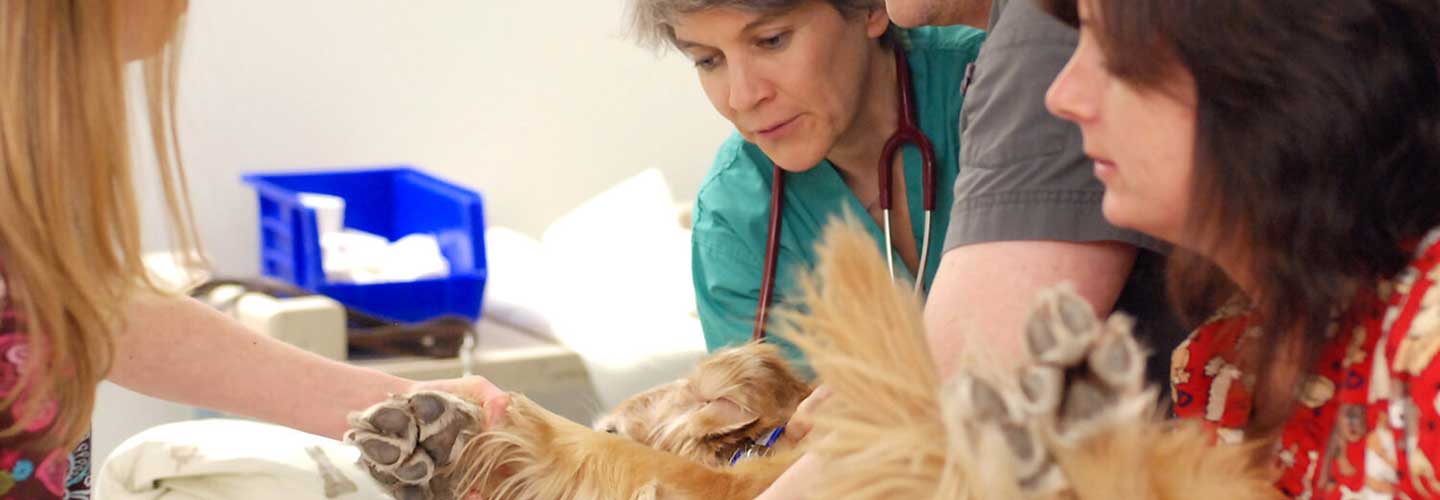
Clinical Care
What to Expect
If you have never participated in a clinical trial with one of your pets, here is a brief overview of how the process works. In general, our clinical trials aim to evaluate novel ways to re-direct the immune system to target cancer cells.
Since the eligibility requirements and therapies being studied are different for each trial, the first step is to speak with one of our veterinarians to determine if your dog may be eligible.
What types of patients can benefit from immunotherapy?
Immunotherapy can help a wide variety of patients. This is because many cancers express tumor-associated antigens – recognizable features that are present in cancer cells, but not as commonly present in normal cells. These features enable treatments to be targeted specifically to cancer cells, while minimizing damage to normal cells in the body.
Ask Us Anything
At that time, you are welcome to ask any questions you have about the trial, what your dog’s participation will be like, or the treatment being evaluated.
We are also happy to speak with your dog’s primary care veterinarian to be sure the trial would be a good fit for your dog.
A diagnosis of cancer is devastating — we understand that you may be hearing an overwhelming amount of information about different treatment options, and it’s hard to take it all in at once. You are always welcome to call or email again after we talk, if you think of additional questions or points to clarify.
First Appointment
Are We a Good Fit?
If we have a trial that may be a match for your dog, we will then set up a screening visit – this is generally scheduled through Dr. Nicola Mason, 215-898-3996, nmason@upenn.edu.
The aim of this appointment is to determine if your dog is a candidate for the trial. We may send you some information about the study to read before your appointment — please feel free to ask us questions about what you have read at any time.
Screening visits are usually scheduled at 8 am. If you are driving from outside of Philadelphia, you may want to leave a bit of extra time for the drive — city traffic in the mornings can be unpredictable! We have free parking available, in the lots to the left as you turn into the hospital entrance. Once you have parked, please check in at the front desk — the client service representative assisting you will notify Dr. Mason that you have arrived.
Next, you’ll meet Dr. Mason – we will examine your dog, discuss his or her history in detail, discuss the clinical trial, and go over your dog’s plan for the day.
Please feel free to ask any questions you have at any stage of this process – we want to be sure you understand exactly what is happening with your dog’s care, so you can make the best decisions for him or her. We’ll talk about any diagnostics or procedures planned for the day, whether any sedation or anesthesia would be required, and any possible risks.
Once we’ve come up with a plan, your dog will spend a portion of the day at Penn Vet with us. During this time, you are welcome to either stay in the city (we are happy to provide recommendations for local restaurants or other places to visit) or return home.
After your visit, we’ll call your primary care veterinarian with an update and any test results.
- We will take down the best contact information to reach you with updates, and you are welcome to call us at any time if you would like to check in on how your dog is doing.
- After your dog has completed all steps of the day, we will give you a call to come back to Penn Vet.
- We will then go over the results of any tests, set up a plan for your next visit, and answer any questions you may have.
Still Have Some Questions?
Here are some frequently asked questions about participating in a clinical trial at Penn Vet:
Our patients are housed adjacent to the oncology ward, in large kennels that open into a shared studying/rounding space. Patients are monitored by nursing staff and a trial veterinarian, have free access to water throughout the day, and are walked frequently in an outdoor run.
- Many of our patients have chest x-rays or an abdominal ultrasound (sonogram) as part of the screening process.
- Your dog will briefly lay on his/her side or back on a table while we take the x-rays, supported by foam cushions or sandbags.
- For an ultrasound, your dog will have a large patch of fur shaved over his/her abdomen before laying on a table while a radiologist performs the exam.
- Neither of these tests hurt at all, although some dogs find them a bit unusual. Some of our patients benefit from light sedation to help them relax.
